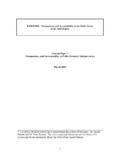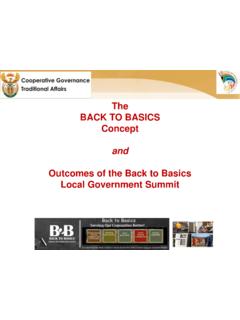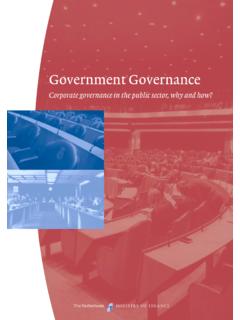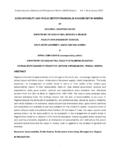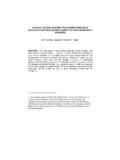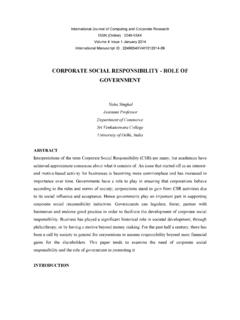Transcription of Towards better stewardship: concepts and critical issues
1 WHO/EIP/ : GeneralOriginal: EnglishTowards better stewardship : concepts and critical issuesPhyllida TravisDominique EggerPhilip DaviesAbdelhay MechbalEvidence and Information for PolicyWorld Health Organization, Geneva20022 Towards better stewardship World Health Organization, Geneva, 2002 This document is not a formal publication of the World Health Organization (WHO) andall rights are reserved by the Organization. The document may, however, be freelyreviewed, abstracted, reproduced and translated, in part or in whole, but not for sale orfor use in conjunction with commercial views expressed in documents by named authors are solely the responsibility ofthose better stewardship1 Towards better stewardship : concepts AND critical ISSUESP Travis, D Egger, P Davies, A MechbalI.
2 INTRODUCTIONThe World Health Report 2000 (WHR2000) (1) identified four core functions that all healthsystems carry out in some way, regardless of how they are organized or where they were financing, resource generation, service delivery and stewardship . In order toexplain attainment of health system outcomes and efficiency, greater understanding ofthese four health system functions is required. This paper focuses on the function Report broadly defined stewardship as the careful and responsible management ofthe well-being of the population , and in the most general terms as the very essence ofgood government.
3 stewardship is the responsibility of government usually throughthe health ministry. This does not mean that government needs to fund and provide allinterventions. And certain stewardship tasks may themselves be delegated to otheractors. Who these are depends on how the health system is for different aspects of stewardship may be divided (intentionally orotherwise) between central and sub-national health authorities, local government, otherministries such as finance, planning, civil service commissions, audit commissions,parliamentarians, professional associations, ombudsmen, inspectorates, insurance funds,other purchasing agents (sometimes including donors) and even some providers.
4 But acountry s government, through its health ministry, remains the steward of stewards for the health system, with a responsibility to ensure that they collectively provideeffective has similarities to the notion of public governance, but as envisaged byWHO is more specifically focused on the state's role in taking responsibility for thehealth and well-being of the population, and guiding the health system as a whole. Itinfluences the ways other health system functions are undertaken. In addition, it embeds the health system in wider society (2).
5 In characterizing stewardship , theReport identified three broad tasks of health system stewardship : providing visionand direction for the health system, collecting and using intelligence, and exertinginfluence - through regulation and other means. It asserted that how well or poorly agovernment executes its stewardship role can influence all health system countries are searching for ways to understand and improve different aspects ofhealth system stewardship . Building on previous work with related concepts , work isnow under way to develop practical ways to assess stewardship , by analysing differentapproaches and then exploring the relationships with attainment in the different healthsystem goals.
6 Efforts will be made to develop approaches that allow comparisonsbetween health systems so that relevant lessons can be paper reports current WHO work on stewardship . Section 2 reviews related work inhealth and other sectors. Section 3 presents WHO s current thinking on domain / sub-functions of stewardship . Section 4 discusses WHO s ideas on how to assessstewardship, and outlines future better stewardshipII. CHARACTERIZING stewardship : RELATED WORK IN HEALTH ANDOTHER SECTORSWhat are the essential things stewards should be doing in order to influence thebehaviour of health system actors?
7 Although the word itself has not previously beenmuch used in relation to health systems, the importance of many of the activities thoughtto contribute to effective stewardship has long been written about (3-5). As a first step inthe current programme of work, related concepts from health and other sectors are beingreviewed in detail. Solid evidence is relatively scarce, but there is quite a lot ofconvergence in prevailing notions of what constitutes good stewardship , especiallyfrom the fields of public health and work on more general governance.
8 Other recentinput into WHO s work on stewardship comes from the Policy-makers Forum (6) andthe WHO Meeting of Experts on the stewardship Function in Health Systems held inSeptember 2001 (2).1. Conceptual issuesThe ways that stewardship or its related concepts are characterized can be dividedbroadly into two groups (7-14). There are those that characterize what should be done, andthose concerned with how things should be done. In general, the public health literaturepays more attention to identifying a wide range of concrete desirable activities ofministries of health in guiding the system (grouped into broad categories such aspolicy and planning, regulation, monitoring and evaluation).
9 It also often refers to how things should be done: many analysts suggest that, for example, participatoryand transparent processes or, put another way, many of the current notions of goodgovernance , are desirable achievements in WHO s current efforts to develop a coherent framework to assess all four functions, arigorous attempt is being made to avoid conceptual overlap between functions. For thisreason, there are some similarities and distinctions worth making between stewardshipas conceptualized in the WHO health system performance assessment framework, therelated concept of the steering role of ministries of health, and Core or Essential Public Health Functions (EPHF) (15;16).
10 The only real difference between the literatureon the steering role and stewardship is that the steering role documents arespecifically devoted to the roles of health ministries in different processes of health sectorreform, whereas stewardship is a function of the whole health system, and its assessmentinvolves considering more than ministries of health. With regard to the Essential PublicHealth Functions, many of them do contain key elements of stewardship . However, thescope of stewardship is broader. It includes ensuring oversight, regulation andaccountability of all actors involved in any of the four health system functions includingfinancing and all aspects of resource generation.










